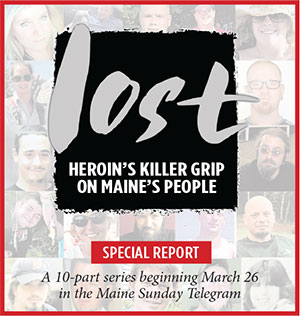A bill that would curtail gifts, speaking and consulting fees and expensive food flowing from pharmaceutical companies to doctors has passed the Legislature and awaits the signature of Gov. Paul LePage.
Rep. Scott Hamann, D-South Portland, said the goal of the bill is to ensure doctors do not have conflicting interests when prescribing drugs – especially opioids – since Maine is in the midst of an opioid crisis.
Maine had 376 drug overdose deaths in 2016 – an average of about one per day – an all-time high and 40 percent higher than in 2015.
“At this point, everyone acknowledges that addiction often starts from overprescribing,” Hamann said. “Overprescribing of opioids is a real problem in this state. When a patient goes to the doctor’s office, they should be confident that the doctor only has the patient’s best interests in mind, and not any outside influences.”
Four of five new heroin users were first addicted to prescription opioids, according to the American Society of Addiction Medicine.
Hamann’s bill would ban all cash gifts and only allow noncash gifts of “minimal” value. Any gifts where “reciprocity is expected or implied” would also be prohibited.
The bill does carve out exceptions for “modest meals” during educational seminars, and permits speaking fees for doctors presenting research at legitimate educational conferences. The bill also permits drug companies to drop off free drug samples for patients.
The Maine Medical Association, which represents doctors’ interests before the Legislature, was officially neutral on the bill. But Gordon Smith, the association’s executive vice president, said he sees some benefits to it.
“It would eliminate any perception that there’s a conflict of interest among doctors,” Smith said. “The bill is also consistent with our code of ethics.”
Hamann said he thought of introducing the bill after reading a December report in the Maine Sunday Telegram detailing increased spending by pharmaceutical companies to promote opioids in Maine despite efforts by doctors’ groups to persuade doctors to cut back on opioid prescribing.
The bill – which was approved Thursday without a roll call vote in both legislative chambers – has attracted broad bipartisan support. Neither LePage nor the Maine Department of Health and Human Services has weighed in on the measure, but the administration has supported efforts to reduce unnecessary opioid prescribing, including a stringent bill passed last year that restricts prescribing opioids for chronic pain.
The U.S. Centers for Disease Control and Prevention has concluded there is “insufficient evidence” that opioids are effective at controlling chronic pain, and the painkillers present many dangers to patients.
Meanwhile, spending in Maine by drug companies on doctors, including food, consulting and speaking fees, to market opioids climbed from $21,654 in 2014 to $42,550 in 2015, the latest year for which the federal data are available.
For all drugs and medical devices, pharmaceutical industry spending in Maine on doctors totaled $11.9 million from 2013 to 2015, according to federal data made public through the Affordable Care Act.
Medical ethics experts say such payments from drug companies to doctors can influence prescribing patterns, and that listening to sales pitches from company representatives has no legitimate educational value for physicians. In some cases, drug companies were paying doctors thousands of dollars to appear at company-sponsored conferences that served no legitimate research purposes.
A Harvard Medical School professor told the Telegram in December that several studies conclude there’s a correlation between doctors’ willingness to prescribe drugs and receiving free food or other gifts from drug companies.
Send questions/comments to the editors.




Comments are no longer available on this story